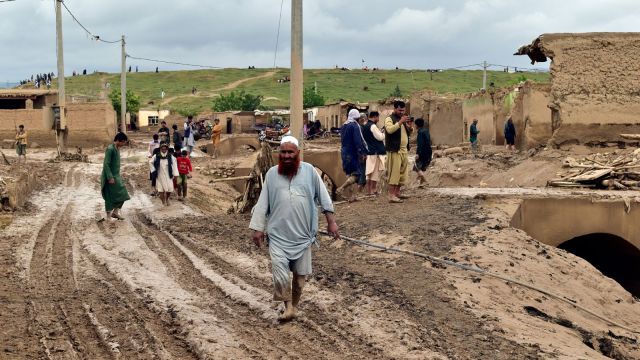 People gather around their damaged houses after heavy flooding in Baghlan province in northern Afghanistan Saturday, May 11, 2024. (AP Photo)
People gather around their damaged houses after heavy flooding in Baghlan province in northern Afghanistan Saturday, May 11, 2024. (AP Photo)Flash floods, that have ripped through northern Afghanistan, have left more than 300 people dead, the United Nations World Food Programme (WFP) said.
The WFP, which operates throughout Afghanistan, said on X that floods had killed more than 300 people in the worst-hit province of Baghlan, where more than 1,000 homes have been destroyed. However, it did not give a source for its figure.
In response to inquiries regarding the WFP’s figure, a spokesperson for the Taliban government in country mentioned only half the numbers with the interior ministry saying that at least 153 people across three provinces have been killed due to the flash floods.
At least 138 people have also been injured in the flooding across the three northern provinces Baghlan, Takhar and Badakhshan, caused by heavy rains on Friday, ministry spokesman Abdul Mateen Qaniee told new agency Reuters, adding that death toll could rise.
 https://indianexpress.com/wp-content/upl...ze=450,301 450w, https://indianexpress.com/wp-content/upl...ze=600,401 600w, https://indianexpress.com/wp-content/upl...ze=768,513 768w, https://indianexpress.com/wp-content/upl...ze=606,405 606w, https://indianexpress.com/wp-content/upl...=1536,1027 1536w, https://indianexpress.com/wp-content/upl...=2048,1369 2048w" width="2992"> People clean up their damaged homes after heavy flooding in Baghlan province in northern Afghanistan Saturday, May 11, 2024. Flash floods from seasonal rains in Baghlan province in northern Afghanistan killed dozens of people on Friday, a Taliban official said. (AP Photo/Mehrab Ibrahimi)
https://indianexpress.com/wp-content/upl...ze=450,301 450w, https://indianexpress.com/wp-content/upl...ze=600,401 600w, https://indianexpress.com/wp-content/upl...ze=768,513 768w, https://indianexpress.com/wp-content/upl...ze=606,405 606w, https://indianexpress.com/wp-content/upl...=1536,1027 1536w, https://indianexpress.com/wp-content/upl...=2048,1369 2048w" width="2992"> People clean up their damaged homes after heavy flooding in Baghlan province in northern Afghanistan Saturday, May 11, 2024. Flash floods from seasonal rains in Baghlan province in northern Afghanistan killed dozens of people on Friday, a Taliban official said. (AP Photo/Mehrab Ibrahimi)The devastation
“On current information: In Baghlan province there are 311 fatalities, 2,011 houses destroyed and 2,800 houses damaged,” said Rana Deraz, a communications officer for the UN agency in Afghanistan told new agency Agence France-Presse.

Zabihullah Mujahid, the chief spokesman for the Taliban government, said in a social media post on Saturday that “hundreds … have succumbed to these calamitous floods, while a substantial number have sustained injuries”.
Apart from Baghlan, the provinces of Badakhshan in the northeast, central Ghor and western Herat were also heavily affected, he wrote on X, adding that “the extensive devastation” had resulted in “significant financial losses”.
Richard Bennett, the UN special rapporteur on the situation of human rights in Afghanistan, said on X that the floods are a stark reminder of Afghanistan’s vulnerability to the climate crisis and that both immediate aid and long-term planning by the Taliban and international actors are needed.
 https://indianexpress.com/wp-content/upl...ze=450,301 450w, https://indianexpress.com/wp-content/upl...ze=600,401 600w, https://indianexpress.com/wp-content/upl...ze=768,513 768w, https://indianexpress.com/wp-content/upl...ze=606,405 606w, https://indianexpress.com/wp-content/upl...=1536,1027 1536w, https://indianexpress.com/wp-content/upl...=2048,1369 2048w" width="2992"> People walk near their damaged homes after heavy flooding in Baghlan province in northern Afghanistan Saturday, May 11, 2024. Flash floods from seasonal rains in Baghlan province in northern Afghanistan killed dozens of people on Friday, a Taliban official said. (AP Photo/Mehrab Ibrahimi)
https://indianexpress.com/wp-content/upl...ze=450,301 450w, https://indianexpress.com/wp-content/upl...ze=600,401 600w, https://indianexpress.com/wp-content/upl...ze=768,513 768w, https://indianexpress.com/wp-content/upl...ze=606,405 606w, https://indianexpress.com/wp-content/upl...=1536,1027 1536w, https://indianexpress.com/wp-content/upl...=2048,1369 2048w" width="2992"> People walk near their damaged homes after heavy flooding in Baghlan province in northern Afghanistan Saturday, May 11, 2024. Flash floods from seasonal rains in Baghlan province in northern Afghanistan killed dozens of people on Friday, a Taliban official said. (AP Photo/Mehrab Ibrahimi)Video clips on social media showed huge torrents of muddy water swamping roads – and bodies shrouded in white and black cloth.
One of the clips showed children are crying and a group of men are looking at floodwaters, in which bits of broken wood and debris from homes can be seen.
Many people had been left homeless and transportation, water and waste systems were “severely disrupted”, the World Health Organisation said.
🔴Breaking: Flash floods ravage #Afghanistan, killing more than 300 people in Baghlan and destroying more than 1000 houses.
This has been one of many floods over the last few weeks, due to unusually heavy rainfall. WFP is now distributing fortified biscuits to the survivors. pic.twitter.com/X4AaBW5TIC
— WFP in Afghanistan (@WFP_Afghanistan) May 11, 2024
“The impact has been profound, leading to loss of life and injuries, with many individuals still unaccounted for,” the WHO’s Afghanistan office said in a statement late on Friday.
The Afghanistan capital, Kabul, was also not spared from the heavy rains and experienced its own flooding, Abdullah Janan Saiq, the Taliban’s spokesman for the State Ministry for Natural Disaster Management, said.
The rescue
Mujahid mentioned that the government authorities, including the Ministry of Disaster Management, the Ministry of Interior Affairs, and provincial officials, are directed to mobilise all available resources expeditiously for the purpose of rescue operations, evacuation of the deceased, and medical treatment for the injured. He also urged the citizens to assist the affected victims of this natural disaster.
According to the Taliban Ministry of Defense, the air force initiated evacuation efforts, transporting over 100 injured individuals to military hospitals. However, specific provinces were not mentioned in their statement.
 https://indianexpress.com/wp-content/upl...ze=450,301 450w, https://indianexpress.com/wp-content/upl...ze=600,401 600w, https://indianexpress.com/wp-content/upl...ze=768,513 768w, https://indianexpress.com/wp-content/upl...ze=606,405 606w, https://indianexpress.com/wp-content/upl...=1536,1027 1536w, https://indianexpress.com/wp-content/upl...=2048,1369 2048w" width="2992"> An Afghan man collects his belongings from his damaged home after heavy flooding in Baghlan province in northern Afghanistan Saturday, May 11, 2024. Flash floods from seasonal rains in Baghlan province in northern Afghanistan killed dozens of people on Friday, a Taliban official said. (AP Photo/Mehrab Ibrahimi)
https://indianexpress.com/wp-content/upl...ze=450,301 450w, https://indianexpress.com/wp-content/upl...ze=600,401 600w, https://indianexpress.com/wp-content/upl...ze=768,513 768w, https://indianexpress.com/wp-content/upl...ze=606,405 606w, https://indianexpress.com/wp-content/upl...=1536,1027 1536w, https://indianexpress.com/wp-content/upl...=2048,1369 2048w" width="2992"> An Afghan man collects his belongings from his damaged home after heavy flooding in Baghlan province in northern Afghanistan Saturday, May 11, 2024. Flash floods from seasonal rains in Baghlan province in northern Afghanistan killed dozens of people on Friday, a Taliban official said. (AP Photo/Mehrab Ibrahimi)The Ministry has also declared a state of emergency in affected areas and commenced the distribution of tents, blankets, food, medicine, and first aid to those impacted.
Hedayatullah Hamdard, head of Baghlan’s natural disaster management department, earlier told AFP that the death count may escalate further. He noted that light rainfall persisted throughout the night in multiple districts of the province.
The emergency personnel were searching for any possible victims under the mud and rubble, with the help of security forces from the national army and police, Hamdard added.
A climate-sensitive nation, Afghanistan was battered by a similar calamity in April as heavy rains and flash floods resulted in the deaths of at least 100 people across 10 provinces in Afghanistan. No region has been left untouched by the devastation.
The flooding has inundated farmland, posing a significant threat to a country where 80 percent of its more than 40 million people rely on agriculture for sustenance.
Afghanistan’s vulnerability to climate change is exacerbated by its relatively dry winter, making it challenging for the soil to absorb rainfall. This vulnerability is compounded by the nation’s prolonged history of conflict, spanning four decades, and its status as one of the poorest countries globally. According to scientists, Afghanistan is among the least prepared nations to confront the consequences of global warming.
 Earn Coin
Earn Coin Mining
Mining
 Play Games
Play Games




 Spin Wheel
Spin Wheel Miner
Miner Play & Win
Play & Win